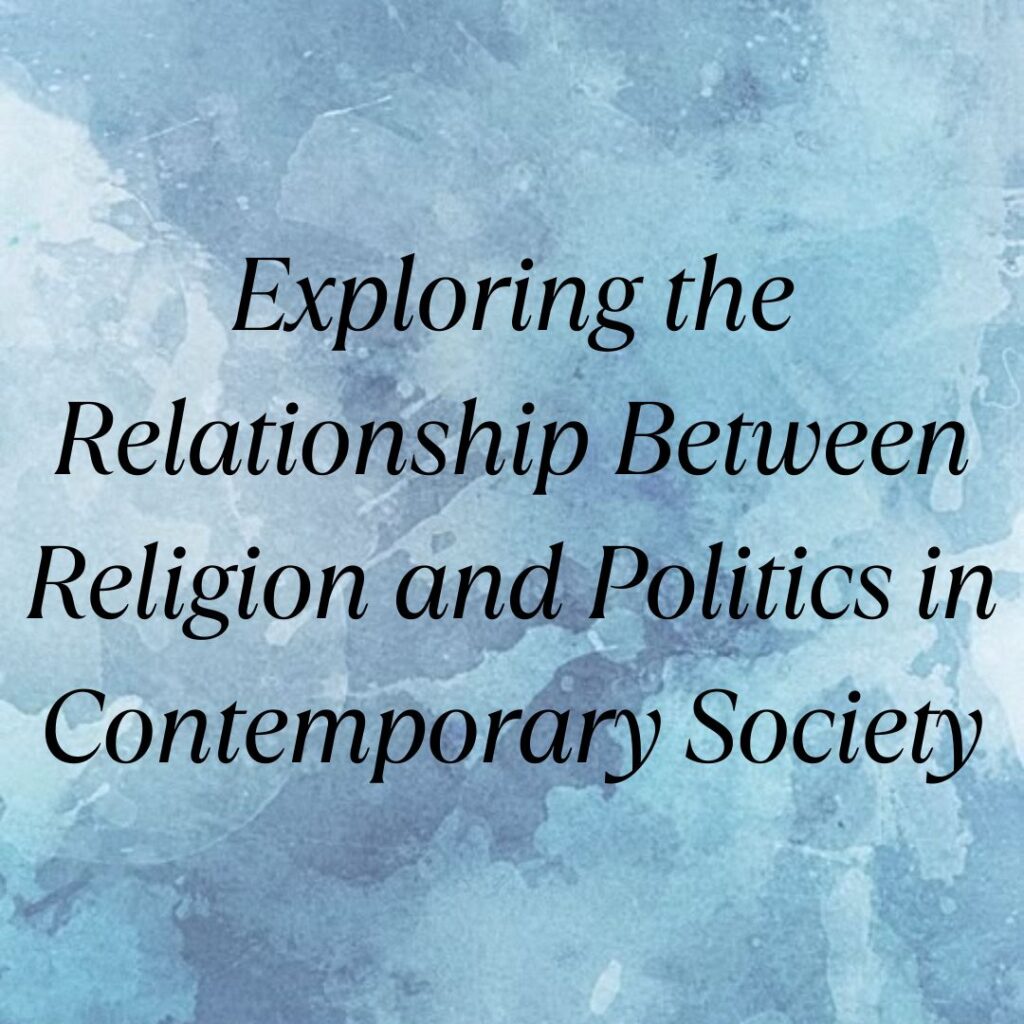In contemporary society, the relationship between religion and politics is a topic of intense debate and scrutiny. This dynamic interplay influences legislation, cultural norms, and the very fabric of nations. From the influence of evangelical Christians in American politics to the rise of Hindu nationalism in India, the intersection of faith and governance is both complex and compelling. Let’s delve into this intricate relationship, exploring its nuances and implications in the modern world.
Historical Context: A Long-Standing Relationship
Historically, religion and politics have always been intertwined. Monarchs and rulers often derived their authority from divine right, claiming their power was granted by a higher power. This confluence of religious authority and political power was evident in ancient civilizations like Egypt, where Pharaohs were considered gods, and in medieval Europe, where the Catholic Church wielded immense influence over kings and emperors.
In modern times, the relationship has evolved but remains significant. The separation of church and state, a principle enshrined in many constitutions, aims to delineate the boundaries between religious and political spheres. However, the extent to which this separation is maintained varies widely across different nations and cultures.
Religion in American Politics: The Evangelical Influence
In the United States, the influence of religion on politics is profound. Evangelical Christians have become a powerful voting bloc, significantly shaping the political landscape. This group, which comprises a substantial portion of the population, has been instrumental in the election of several conservative leaders.
For instance, the election of Donald Trump in 2016 was heavily supported by evangelical voters. His policies on issues such as abortion, same-sex marriage, and religious freedom resonated with this demographic, highlighting the powerful role religion can play in electoral outcomes. The endorsement of Trump by prominent evangelical leaders underscored the symbiotic relationship between religious conviction and political allegiance.
The Role of Religion in Middle Eastern Politics
In the Middle East, religion and politics are often inseparable. Many nations in this region base their legal and political systems on Islamic principles. Countries like Saudi Arabia, Iran, and Pakistan incorporate Sharia law into their legal frameworks, profoundly influencing their governance and societal norms.
In Iran, the concept of Velayat-e Faqih (Guardianship of the Islamic Jurist) places significant political power in the hands of religious leaders. The Supreme Leader, a religious figure, holds ultimate authority over the government, illustrating the profound impact of religious doctrine on political structures.
Hindu Nationalism in India: A Growing Trend
India, a country with a rich tapestry of religious diversity, has seen a resurgence of Hindu nationalism in recent years. The rise of the Bharatiya Janata Party (BJP) under Prime Minister Narendra Modi has brought Hindu nationalist ideologies to the forefront of Indian politics. The BJP’s platform often emphasizes Hindu values and culture, sometimes at the expense of minority religious groups.
Policies such as the Citizenship Amendment Act (CAA) and the abrogation of Article 370, which granted special autonomy to the Muslim-majority region of Jammu and Kashmir, have sparked controversy and debate. Critics argue that these measures undermine the secular fabric of the Indian state, while supporters claim they are necessary for national unity and security.
Religion and Politics in Europe: Secularism vs. Religious Identity
Europe presents a different scenario, where secularism is a foundational principle in many countries. However, the relationship between religion and politics is still significant. The influx of immigrants and refugees from predominantly Muslim countries has reignited debates over national identity, religious freedom, and secular values.
In France, for example, the principle of laïcité (secularism) is deeply ingrained in the national ethos. However, policies such as the ban on wearing religious symbols in public schools and the prohibition of full-face veils have sparked controversy. These measures are seen by some as necessary to maintain secularism, while others view them as discriminatory against Muslim communities.
The Global Impact: Religion and International Relations
The intersection of religion and politics extends beyond national borders, influencing international relations. Religious ideologies can shape foreign policy decisions, foster alliances, and even lead to conflicts.
The relationship between the United States and Israel is a notable example. The strong support for Israel among American evangelicals has influenced U.S. foreign policy in the Middle East. This alliance is rooted in religious beliefs about the biblical significance of Israel, demonstrating how religious convictions can shape international diplomacy.
The Challenges and Opportunities
The relationship between religion and politics presents both challenges and opportunities. On one hand, it can lead to conflicts, discrimination, and the erosion of secular principles. On the other hand, it can inspire movements for social justice, human rights, and peace.
For instance, the civil rights movement in the United States was deeply rooted in religious conviction. Leaders like Martin Luther King Jr. drew on Christian principles to advocate for racial equality and justice. Similarly, the anti-apartheid movement in South Africa was supported by religious leaders who saw the struggle against racial segregation as a moral imperative.
Navigating the Future: A Path Forward
As we navigate the future, it is crucial to find a balance between respecting religious beliefs and upholding secular principles. Ensuring that politics is inclusive and representative of diverse perspectives is essential for fostering social cohesion and stability.
Interfaith dialogue and cooperation can play a vital role in this process. By fostering mutual understanding and respect, we can bridge divides and work towards common goals. Education is also key, as it can help individuals critically engage with both religious and political ideologies, promoting informed and thoughtful participation in civic life.
In conclusion, the relationship between religion and politics in contemporary society is multifaceted and dynamic. It shapes laws, influences leaders, and impacts international relations. By exploring this complex interplay, we can better understand the forces that shape our world and work towards a more inclusive and harmonious society.






